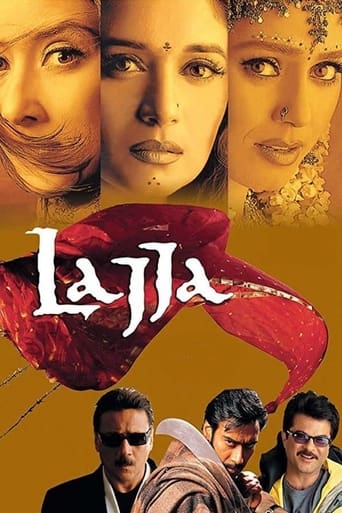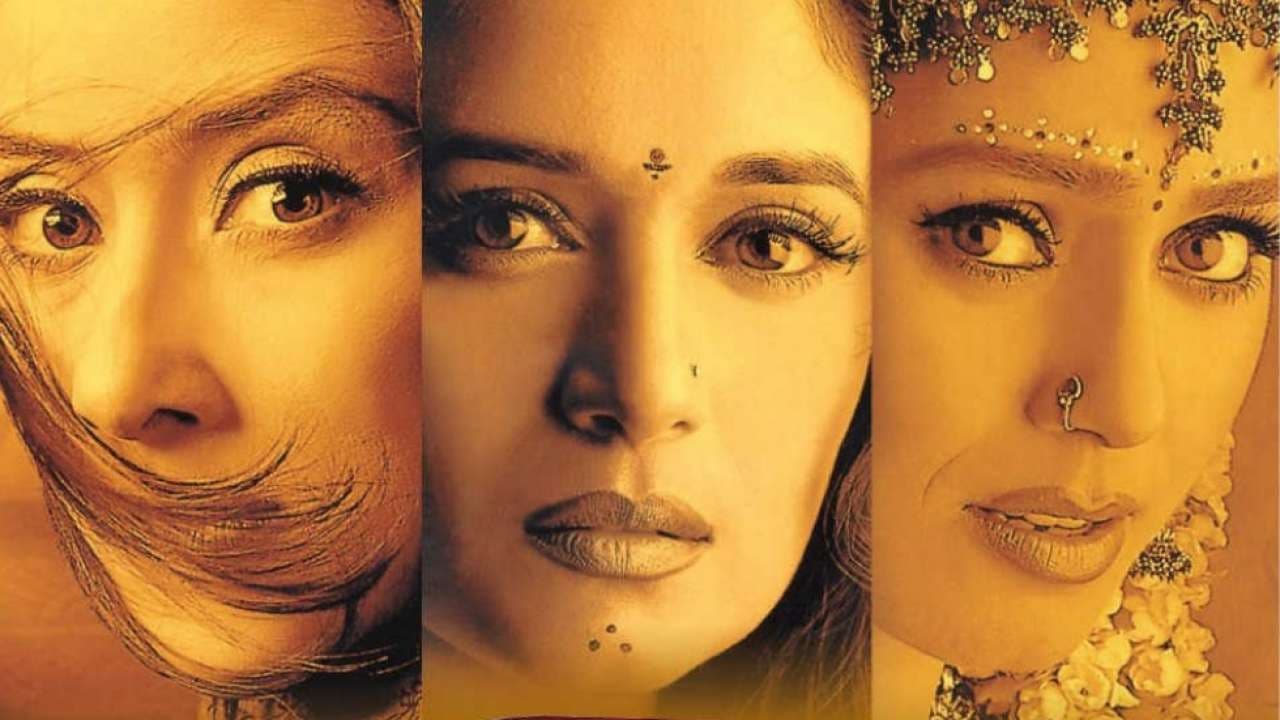daniel schut
Rajkumar Santoshi should be lauded for the subject he takes on, and deserves praise for not being faint-hearted about it. He is not afraid to show, literally, what happens to women in India. That being said, Santhoshi suffers a bit from his 'evangelism': like anyone who has found a true and important message, he tends to over-scream himself a bit: we hear dramatic strings suggesting dire traumas even when manisha in the beginning suffers just minor mishaps compared to the very real trauma we see later on. This overdoing it especially hinders the beginning of the film. The ending of the film is also completely unbelievable: why would Manisha return to Jackie Shroff? Why would Shroff have changed his views of womanhood? I guess its a Bollywood thing to give movies a happy ending, even though I know plenty of them that don't end happily. Then again, a realistic ending would probably have been too much - and in that sense, Santoshi should be excused somewhat for his mishaps, since any medium could not portray the real-live horrors he wants us to see.That said, I think praise should be given to Anil Kapoor and Ajay Devgan for really doing their job really well: they are true supporting actors, and they provide a sparkle of light and hope in a world which is for the rest completely dark. These two characters help Santoshi to make clear that not ALL men are bad, but he also gives these men sufficient lack of depth and somewhat above human proportions to make clear that us men still have some way to go before we are up to a normal, civilized standards. he makes them heroes somewhat, and intendedly so, since I guess he wants to inspire little Indian boys to be like them.The best acting however is done by the ladies. There's not much I can add to what has been said already: Mahima Chaudhary is able to keep it up, Manisha starts off a bit awkward but ends up very impressive - but the most impressive acting is done by Madhuri and Rekha: I can't decide whose performance I found better, but thankfully, I don't have to choose.Madhuri was good since she..well, dear god, she's always good! Completely natural, completely in character, and bringing that unique fire and spirit that is hers to every role. From the moment where she interrupts the Ramayana (and to be sure for western viewers, the revolt of the crowd thereafter isn't so unbelievable!) to speak her mind until she gets trampled by the angry crowd, she's just....goddess-like. And mind the little details she puts in her role: when Manisha wants to pick her up after she's been battered, Madhuri at first is also scared of Manisha: I actually felt the mortal fear she portrayed at that moment.And Rekha...wow! Let me rephrase that: WOW!!!! The moment she finds out her son was dating a higher caste girl, who happens to be the daughter of the village bad guy, she bursts out so...WOW!!!! It had my blood curdling, definitely. And then the rape-and-death scene. What made it so strong is that Rekha was actually able to portray how even the closest of friends suddenly become strange beasts: rapists and murderers. She pleas for mercy whilst at the same time she just literally bleeds mortal fear - true mortal fear. Her rendering of Ramdulari is truly, honestly of epic proportions - and I am talking Greek tragedy, Euripides-play epic proportions. Add to that the fact that this scene is based on true events - and you understand that after this scene, the movie has basically ended.But it didn't end: Santoshi made place for one more speech by Manisha (good call) and some weird scenes (bad call). But the attempt at a happy ending and the crappy job Santoshi does at it, does give you time to recover from what you've just witnessed. The sheer idiocy in it allows you to just barely smile at the friends you've watched it with again and be able to talk about what you just witnessed. And when you do, realize: what you've just witnessed is everyday reality still.
akbarnali
The bearings of western-style Feminism on the various subcultures of India have hitherto remained largely non-existent, the two entities belonging to alien realms and threatening (in the name of tradition) never to coincide. Art imitates life (or so the claim goes) and popular Hindi cinema is no exception, reflecting an underlying misogyny which, regrettably, forms the foundation of much of the collective Indian culture. But why? What is it about the female gender that has rendered it so hateful to the culture that women are routinely subject to the most unimaginable horrors, including rape, murder, infanticide, imposed illiteracy, infidelity, and the subjugation of spirit that goes under the name of 'dowry'? Rajkumar Santoshi's latest offering, "Lajja", asks the same plaintive question, linking the atrocities committed against women through three separate chapters/episodes which comprise the journey of shame endured by its protagonist, Vaidehi (Manisha Koirala).Direction on Santoshi's part is not up to par with the level the story demands. He fails to achieve the necessary sensitivity in depicting the saga of sadness and confronts the issue of misogyny from the side, instead of head-on. Santoshi has recently said that he did not make the film for an international film festival, but rather for the masses of his country. Regrettably, the tackiness shows, and the film too often delves into the action-blood-gore genre that Santoshi specializes in. The film suffers from its jerky, episodic pace and its ending is rather too contrived.The female cast is given much kinder and more rounded characterizations than their male counterparts. The protagonist is played sensitively by the luminescently beautiful Manisha Koirala who proves in Lajja that she is one of our time's more competent leading ladies, and given a proper role and set up, emerges with a truly commendable performance. One wonders how brilliantly she may have shone had the film been made by a director with the appropriate creative intention and appreciation of the issue at hand. Mahima Choudhary puts in a laudable performance and continues to show that she is an untapped talent. Cast as Janki, Madhuri Dixit performs with a never-before-seen fervor and felicity for what truly deserves the name of 'acting.' The role of a street smart performer who finds solace in alcohol and the promise of an unborn child stands as the greatest risk in her cannon of song-n-dance roles which have maintained her marquee status over the past decade. Which leaves the final and most disturbing performance in this would-be feminist saga, that of the ceaselessly talented Rekha. Lajja is Manisha Koirala's film, there can be no doubt about that, but it is Rekha who dominates the proceedings in a performance that digs into your bones and sends echoes of terror through the vestibules of your heart. Rekha dazzles as Ramdulari, foregoing vanity and complacency to deliver a performance that is so replete with authenticity and ingenuity that emotional nudity becomes the mantra of this portion of the film. Comparisons are indeed odious, especially when rendered opposite one of the world's great leading ladies, but in the gracious presence of this reigning screen legend the others fade in her shadow."Lajja" has none of the sophistication of proto-feminist dramas like "Zubeidaa", "Pinjar", or even the Hell-Queen celebration "Laadla": it fulfills its feministic goals in two early moments:the loud tirade in which Mahima berates her in-laws for their abuse of her father who has committed no other crime than given birth to a girl. She erupts, leaving the wedding procession in shambles. Seeing her father devastated, she begins to weep, blaming herself for the chaotic destruction in front of her. She bemoans, "Why did I say anything? I have ruined everything! It is all my fault!" Her grandmother, witnessing silently the abuse she bore, comforts her by saying, "Why are you crying? There is no reason for you to be crying. You are not at fault for anything. The fault is mine. The fault is of every woman who came before you, because if we had had the courage to say in our day what you have said today, there would have been no need for you to say anything today." In this scene the importance of the Feminist Legacy is laid plainly in sight through words.The other, more subtle moment comes very early in the film when Vaidehi (Manisha) has fled from her abusive husband to the refuge of her parents' home in India. To viewers of western societies, it may seem perfectly reasonable (indeed, natural) that any abused woman would seek the protective guardianship of her parents; this, however, is a societal taboo in many eastern cultures, India among them. Once a woman has been married, the identity she assumes is that of her husband and his personal assets (family, business, children, etc.) For her to turn her back on these responsibilities is a grave social sin, one which truly has no equivalent for the western woman. She is thereafter regarded as tainted and as 'damaged goods', one whose value has been nullified entirely by her own actions and her refusal to submit to the role she has been given. She is not so much an individual as she is an emblem of familial honor. Her father rebukes her for her actions, concerned that his familial honor will be tarnished irreparably by the daughter he had already transferred to another man. His primary concern is that of the impending marriage of Vaidehi's younger sister, a prospect made far less likely with a divorced elder daughter in the same household. He tells her in no uncertain that she must return to the man to whom she lawfully belongs, however violent and sadistic he may be. He levies against her the age old adage that, "The honor of every home lies in the hands of its daughter." Quietly and pensively, she replies, "Yes, the honor of every home lies in the hands of its daughter. But there is no honor for the daughter herself."
gunsha
This is got to be a classic of Hindi cinema. It is so well done, technically and performance-wise and the selection of the top-class female cast alone is a reason to like this film. But most of all it did an outstanding job of taking on a serious issue and yet produce a powerful work of art that shines.Right from the start, it is chilly, that cry of Ramdulai and the sari floating in the wind. This nightmare dream makes it clear that this is not going to be fun. The most disturbing events are shot in a frightening detail, but this is not a plain documentary like Bandit Queen, but is more elaborate as a movie for the common people. Thus the message is deeply moving but still bearable even to the more sensitive audience. The comedy and the action are well executed to lighten up the message, but they never become a purpose in themselves, and they always help in delivering the message of humanity, empowerment, and hope. Marvelous, simply marvelous!I give this a 10/10 without the slightest doubt. It outshines even the greatest movies of recent years, such as Pinjar, Lagaan or Swades, Earth, Mission Kashmir, Roja, Bombay, and Dil Se. But Lajja is not for everyone. As a westerner I will say especially that this is not a beginner's film to Hindi cinema. If you don't have a fundamental love for India (yet), you should not watch this, instead watch Swades or Lagaan first.
Sam Rupani (rupanisp)
Her Excellency Great Madam Urmila Matondkar has performed the best song of her life time.Aaye ye Aajaiye. Music is very good.His Excellency Great Mr. Jackie Shiroff has done very well in this song.An excellent song.Thanks and Regards.



 AD
AD



